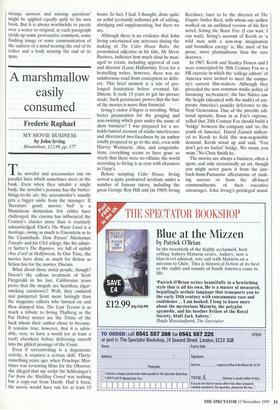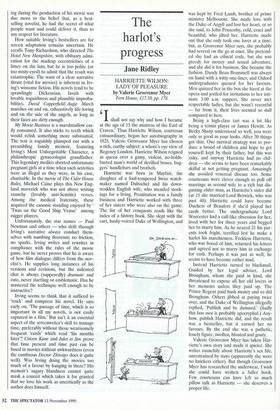A marshmallow easily consumed
Frederic Raphael MY MOVIE BUSINESS by John Irving Bloomsbury, £12.99, pp. 177 The novelist and screenwriter run on parallel lines which sometimes meet at the bank. Even when they inhabit a single body, the novelist's persona has the better- things-to-do air; the screenwriter's usually gets a bigger smile from the manager. If 'literature good; movies bad' is a Manichean distinction few critics have challenged, the cinema has influenced the Century's classics more than is routinely acknowledged: Eliot's The Waste Land is a montage, owing as much to Eisenstein as to the Upanishads. Don Passos' Manhattan Transfer and his USA trilogy, like his admir- er Sartre's The Reprieve, are full of stylish clins d'oeil at Hollywood. In Our Time, the movies have done as much for fiction as fiction has for the movies. Discuss.
What about those awful people, though? Doesn't the callous treatment of Scott Fitzgerald in his last, Californian years prove that the moguls are heartless, cigar- smoking carnivores? Well, they endured and pampered Scott more lastingly than the magazine editors who fawned on and then dumped him. The Last Tycoon is as much a tribute to Irving Thalberg as the Pat Hobey stories are the Tristia of the hack whom their author chose to become. It remains true, however, that it is advis- able, very, to have a world (or at least a roof) elsewhere before delivering oneself into the gilded peonage of the Coast.
Even if screenwriting is a degenerate activity, it requires a certain skill. Thirty- something years ago, when Penelope Mor- timer was reviewing films for the Observer, she alleged that my script for Schlesinger's Far from the Madding Crowd was nothing but a copy-out from Hardy. Had it been, the movie would have run for at least 15
hours. In fact, I had, I thought, done quite an artful (certainly arduous) job of editing, abridging and supplementing, but there we are.
Although there is no evidence that John Irving entertained any actresses during the making of The Cider House Rules, the pronominal adjective in his title, My Movie Business, indicates how much clout he man- aged to retain, including approval of cast and director (Lasse HallstrOm). Even for a bestselling writer, however, there was no unlaborious road from conception to deliv- ery. This brief memoir is a tale of pro- longed frustration before eventual ful- filment. It took 13 years to get his picture made. Such persistence proves that the lure of the movies is more than financial.
Irving's violon d'Jngres is wrestling. What better preparation for the gouging and arm-twisting which goes under the name of show business? I was prepared for a no- holds-barred account of studio interference and directorial two-facedness by an author totally prepared to go to the mat, even with Harvey Weinstein. Alas, and congratula- tions, everything seems to have gone so nicely that there were no villains; the world according to Irving is as cosy with charmers as Garp's.
Before scripting Cider House, Irving served a quite protracted novitiate under a number of famous tutors, including the great George Roy Hill and (in 1969) Irving Kershner, later to be the director of The Empire Strikes Back, with whom our author worked on an unfilmed version of his first novel, Setting the Bears Free (I can wait, I can wait). Irving's account of Kersh as 'a wild man with a non-stop imagination and boundless energy' is, like most of his prose, more platitudinous than the case deserves.
In 1967, Kersh and Stanley Donen and I were conscripted by 20th Century Fox to a PR exercise in which the 'college editors' of America were invited to meet the compa- ny's current film-makers. Although they preceded the now common studio policy of favouring 'no-brainers', the late Sixties saw the height (identical with the nadir) of cor- porate America's panicky deference to the Next Generation. One of the juvenile edi- torial upstarts, flown in at Fox's expense, yelled that 20th Century Fox should build a 'bridge' between the company and 'us, the youth of America'. Darryl Zanuck indicat- ed to Kersh to field this non-negotiable demand. Kersh stood up and said, 'You don't get no fuckin' bridge. We swam, you swim.' No Chris Smith he.
The movies are always a business, often a sport, and only occasionally an art, though you might never guess it from the just- back-from-Parnassus affectations of rank- ing auteurs or from the all-kneel commandments of their executive entourages. John Irving's privileged stand-
ing during the production of his movie was due more to the belief that, as a best- selling novelist, he had the secret of what people want and could deliver it, than to any respect for literature.
How suitable Irving's bestsellers are for screen adaptation remains uncertain. He recalls Tony Richardson, who directed The Hotel New Hampshire, with obituary admi- ration for the madcap eccentricities of a limey on the lam; but he is too polite (or too misty-eyed) to admit that the result was catastrophic. The want of a clear narrative thrust (vital for movies) is inherent in liv- ing's winsome fiction. His novels tend to be sprawlingly Dickensian, lavish with lovable roguishness and plausible improba- bilities. David Copperfieldl Augie March marches on and on, exhaustively life-loving and on the side of the angels, as long as their faces are dirty enough.
My Movie Business is a marshmallow eas- ily consumed. It also sticks to teeth which would relish something more substantial. The text is roguishly plumped out with a preambling family memoir, featuring Irving's Most Unforgettable Character, a philanthropic gynaecologist grandfather. This legendary medico aborted unfortunate pregnant girls at a time when such activities were as illegal as they were, in his case, charitable, In the movie of The Cider House Rules, Michael Caine plays this New Eng- land maverick who was not above writing raunchy (lovably anti-Semitic) verses. Among the medical fraternity, these acquired the canonic standing enjoyed by 'Twas on the Good Ship Venus' among rugger players.
Unfortunately, the star names — Paul Newman and others — who drift through Irving's narrative always conduct them- selves with numbing decorum; no friction, no sparks. Irving writes and rewrites in compliance with the rules of the movie game, but he never proves that he is aware of how film dialogue differs from the nov- elist's. He supplies long instances of his versions and revisions, but the indented chat is always (supposedly) dramatic and cute, never startling or emblematic. Has he mastered the technique well enough to be instructive?
Irving seems to think that it sufficed to `track' and compress his novel. He says early on, The passage of time, which is so important in all my novels, is not easily captured in a film.' But isn't it an essential aspect of the screenwriter's skill to manage time, preferably without those wearisomely frequent 'cards' which read 'Six months later'? Citizen Kane and Jules et Jim prove that time present and time past can be fused in movies without awkwardness (even the cumbrous Doctor Zhivago does it quite well). Was Irving doing the movies too much of a favour by hanging in there? His memoir's sugary blandness cannot quite mask a conceit which takes it for granted that we love his work as uncritically as the author does himself.



























































































 Previous page
Previous page